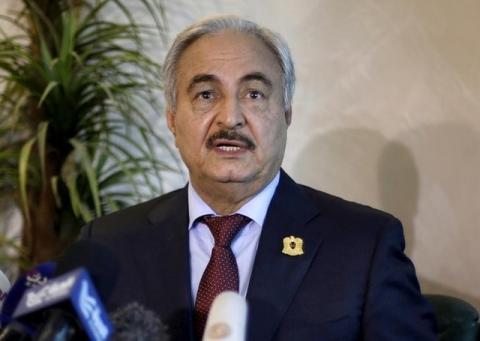Advertisement
Libya's Gen Haftar urges end to arms embargo in U.N. talks
BENGHAZI, Libya (Reuters) - Libya's Gen. Khalifa Haftar, who leads forces allied to the country's recognized government, called for an end to an arms embargo to help fight Islamist militants after holding talks with the U.N. envoy on a peace agreement.
Haftar, a former ally of Muammar Gaddafi before his 2011 ouster, has become one of the most divisive figures among the rival armed factions in Libya, where two competing governments and their military forces are battling for control.
Western powers are pushing the two camps to sign a peace agreement on Thursday that will form a unity government and open the way for more international aid, especially with the growth of Islamic State militants in the turmoil.
But the deal faces resistance on the ground from opponents who want more talks, including the heads of both the country's parliaments. Questions also remain on how armed factions on the ground will react and how to form a national army.
Haftar met U.N. envoy Martin Kobler in the east of Libya late on Wednesday, handing over points he said needed addressing in the draft agreement and urging support for his forces to battle Islamist militants.
"Dialogue cannot continue as it did in the past without any benefit. Otherwise it's a waste of time," Haftar told reporters. "We need the arms embargo on the Libyan army to be lifted, and with that we will have the weapons to carry out our proper role."
Kobler said a unity government would be needed before the United Nations could recognize it as legitimate, and look at providing support or lifting the arms embargo. But that would also require a national army for the whole country, he said.
Libya has no real national military since Gaddafi's fall, instead rival brigades of former anti-Gaddafi rebels control different regions, working in loose coalitions allied with each government.
Tripoli has been controlled by a faction called Libya Dawn since last year after its fighters forced out rival brigades, set up their own government and re-established the old parliament known as the General National Congress.
Most diplomats closed up their embassies and left the capital. Libya Dawn is mostly from the powerful forces of Misrata city allied with Tripoli brigades, some of them Islamist-leaning. But splits have emerged in their ranks.
The recognized government and the House of Representatives have operated out the east, backed by Haftar's forces, and an alliance of other armed groups. Many in the east say he stands for security, but Misrata and Tripoli hate Haftar as a Gaddafi-era leftover who has carried out his own unsanctioned war.
Western powers are promoting the U.N. deal and they hope that war fatigue, the promise of aid and the common threat of Islamic State militants expanding their presence in Libya will carry the unity government and bring opponents onboard.
(Reporting by Ayman Al-Warfalli; writing by Patrick Markey; Editing by Dominic Evans)



















Add new comment